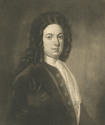 After James VII and II's deposition in England was confirmed by the Scottish Convention in Edinburgh in 1689, those who continued to support the exiled Stuart king became known as "Jacobites". Most Jacobites were Episcopalian or Catholic in sympathy and so there were few in west central Scotland. Some Presbyterians did support the Stuarts, particularly after the Union of 1707 lent a massive boost to Jacobite support, since the policy of the exiled Stuarts was to restore the Scottish Parliament. Initial hostility to the Union was widespread all over Scotland and when the promised economic benefits failed to materialise widespread discontent was manifest. In Glasgow, the Malt Tax riots of 1725 (although not themselves linked to Jacobitism) were sufficiently serious to require the deployment of troops. The churches in the city were suspected of Jacobitism, and the Ramshorn Kirk was established (1720) to combat it.
After James VII and II's deposition in England was confirmed by the Scottish Convention in Edinburgh in 1689, those who continued to support the exiled Stuart king became known as "Jacobites". Most Jacobites were Episcopalian or Catholic in sympathy and so there were few in west central Scotland. Some Presbyterians did support the Stuarts, particularly after the Union of 1707 lent a massive boost to Jacobite support, since the policy of the exiled Stuarts was to restore the Scottish Parliament. Initial hostility to the Union was widespread all over Scotland and when the promised economic benefits failed to materialise widespread discontent was manifest. In Glasgow, the Malt Tax riots of 1725 (although not themselves linked to Jacobitism) were sufficiently serious to require the deployment of troops. The churches in the city were suspected of Jacobitism, and the Ramshorn Kirk was established (1720) to combat it.
 By 1745 Presbyterian support for the Stuarts had almost disappeared. During the Rising of that year, the Whig, anti-Jacobite burgesses of Glasgow supplied only £5,000 in cash and £500 in kind in response to the Jacobite demand for £15,000 cess or land tax (about £2m at today's prices). Meanwhile the professors at the University of Glasgow combined to pay the wages of a pro-Hanovarian company of fifty soldiers.
By 1745 Presbyterian support for the Stuarts had almost disappeared. During the Rising of that year, the Whig, anti-Jacobite burgesses of Glasgow supplied only £5,000 in cash and £500 in kind in response to the Jacobite demand for £15,000 cess or land tax (about £2m at today's prices). Meanwhile the professors at the University of Glasgow combined to pay the wages of a pro-Hanovarian company of fifty soldiers.
 From 26 December to 3 January 1746, upon its return from England, the army of Prince Charles spent a week in Glasgow, but gathered little or no support. However Charles's review of his army on Glasgow Green showed that few had deserted during the march south. The Prince is reputed to have admired the city, but admitted that he had no friends there and there is a tradition that a pistol was aimed or even fired at him in the Saltmarket. Nonetheless he set up his headquarters in the Trongate and gave fine balls while exacting supplies of clothes and shoes, as well as monetary fines, from Glasgow and Paisley to penalise them for their lack of support. Twelve thousand shirts, plus six thousand each of bonnets, waistcoats, shoes and stockings were required of the city. These exactions did nothing to increase enthusiasm for the Jacobites. On 17 January Glasgow militia fought alongside government forces at the Battle of Falkirk where they suffered heavy casualties in a Jacobite victory.
From 26 December to 3 January 1746, upon its return from England, the army of Prince Charles spent a week in Glasgow, but gathered little or no support. However Charles's review of his army on Glasgow Green showed that few had deserted during the march south. The Prince is reputed to have admired the city, but admitted that he had no friends there and there is a tradition that a pistol was aimed or even fired at him in the Saltmarket. Nonetheless he set up his headquarters in the Trongate and gave fine balls while exacting supplies of clothes and shoes, as well as monetary fines, from Glasgow and Paisley to penalise them for their lack of support. Twelve thousand shirts, plus six thousand each of bonnets, waistcoats, shoes and stockings were required of the city. These exactions did nothing to increase enthusiasm for the Jacobites. On 17 January Glasgow militia fought alongside government forces at the Battle of Falkirk where they suffered heavy casualties in a Jacobite victory.